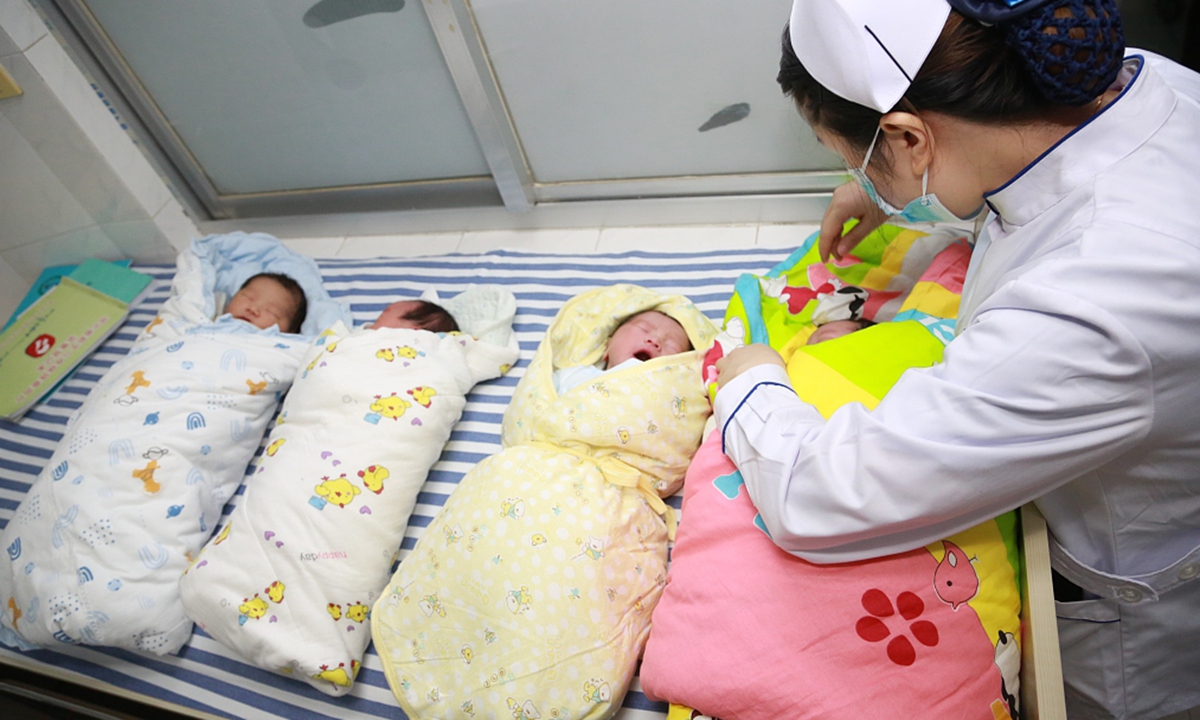
third-child policy Photo:VCG
As a lack of proper people to take care of babies is the primary factor that prevents childbearing, China is working to invest more to improve nursery institutions to decrease families' burdens and increase their willingness to have children, said senior officials from the National Health Commission (NHC) and National Development and Reform Commission (NDRC) at a press conference on Wednesday.
On Wednesday, the NHC held a press conference to further introduce support policies in
a guideline that was jointly released by 17 government agencies on Tuesday with the aim to support each couple to have a third child, create a friendly environment for marriage and fertility, and promote population growth.
The guideline, which was rare to see as it was released by so many ministries and departments, underscored the seriousness of the growth rate of China's population, which has slowed significantly, with a negative growth expected before 2025.
Among 20 policies listed in the guideline, support measures to develop equitable nursery services that will benefit the public have attracted great attention.
Hao Fuqing, a director of the NDRC, said at the press conference that developing nursery services has an obvious influence on improving the willingness to have children, while such services are in short supply as one-third of the families in mid-sized and big cities have this need.
The guideline offered to expand residential nursery services, develop state-run institutions, encourage social institutions to join, and explore ways to let kindergartens with conditions take in children aged two to three years old, Hao said.
More investments and subsidies will be offered to improve the nursery industry. Du Xixue, an official from the NHC, said at the conference that the NHC and NDRC conducted a specific campaign from 2020 to 2022 to invest 2 billion yuan ($295 million) from the budget of the central government, and they made efforts to have local governments invest more than 5 billion yuan to increase nursery services.
However, Du also admitted that at the end of 2021, China's nursery capacity for children under three years per 1,000 people was 2.03, which was far from realizing the target set in the 14th Five-Year Plan (2021-25) of 4.5, and local governments should speed up improvements in the field to support fertility.
The support policies, especially on adding the supply of nursery services and setting up professional certifications to increase the quality of related services, are what families that plan to have children urgently need, Song Jian, a demographer from the Center for Population and Development Studies of the Renmin University of China, told the Global Times on Wednesday.
Song and her team conducted a national survey starting last year, in which they found that more than 50 percent of the families surveyed want to have more children, and most of the couples under 40 years old that have fertility potential are willing to have more children.
The incentives listed in the guideline, if fully implemented, will help encourage families to have more children, said Song.
Song noted that according to their survey, the main reasons that hinder couples from having one or more children are whether they have enough support and the family's income level. Compared with providing cash, government preferential policies will benefit more people in the long run.
Song took the support policies on developing nursery services for example. A reduction of individual income taxes for couples who need to raise children is necessary to support families. Offering tax reductions to institutions that offer nursery services will encourage more social forces to join in the field to bring benefits to families, society and the country, Song noted.
At the press conference, senior officials from the National Healthcare Security Administration and All-China Federation of Trade Unions also introduced details on support policies for families with more than one child in the areas of public rental housing, improving maternity insurance and subsidies, and defending females' equal employment rights.
In the past years, many places in China have explored methods to support childbearing based on the principles of the central government, and the Tuesday guideline is a systematic conclusion of this experience, Song noted.
Despite the current incentives to encourage childbearing, demographers are calling for stronger policies to encourage fertility amid the increasing pressure of a population decline.
The Western media has also paid great attention to the guideline since Tuesday, while some took the opportunity to criticize China's dynamic COVID-zero policy, claiming that China's prevention measures have made people less willing to have children.
Chinese experts refuted such claims and said they do not fit into the rules of population development or the facts. A low fertility rate relates to social development, increasing higher education and other factors, and any temporary policy has little effect on the general trend.




